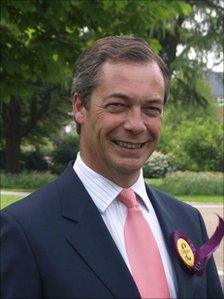Farage wants UKIP to become Britain's 'third party'
- Published

Nigel Farage says he is the front man and the salesman for UKIP
The UK Independence Party is meeting for its first conference since Nigel Farage returned as leader. As our political correspondent Mike Sergeant finds out, the party members are aiming high.
You could sense the relief at this conference.
UKIP's second place in the Barnsley by-election gave activists some warm cheer to protect them from the icy Scarborough winds.
And they also seemed very thankful to have the colourful Nigel Farage back as party leader.
He stood down to try to become an MP, but is now back at the helm after a failed general election campaign.
The man who once described Belgium as a "non-country", and survived a plane crash on the day of the election, was in typically entertaining form.
He strolled up to me at lunchtime by the seaside with a glass of wine in one hand and a cigarette in the other.
I put it to him that he was more of a figurehead now than a party leader, having mostly delegated the running of UKIP to others. "I am the frontman" he said, seeming to acknowledge that his job was as much about performance as policy.
Springboard
There's no doubt that Mr Farage does a good turn whether in a TV interview or on the conference stage. But he looked a little nervous as he approached the platform.
"Good morning everybody" he began, 10 minutes into the afternoon. But after that, Mr Farage was quickly into his stride.
Of course, the result in Barnsley was the focus. The UKIP leader said it would be a springboard to "better things". He said his party had "thrashed the Lib Dems into the ground".
Then came UKIP's most ambitious aim - to supplant the Liberal Democrats as the third main party in British politics.
The idea that instinctively pro-European Lib Dems might switch to a party that defines itself by its hostility to the EU might seen fanciful.
But UKIP says there is much more overlap than you might think - particularly on civil liberties and tax.
So the party is attempting a strategic shift. For years the Tories have had (mostly unfounded) concerns that UKIP would lure its voters away.
Cultural gulf
Now UKIP seems more interested in trying to capitalise on the perceived weakness of the Liberal Democrats.
But there are questions about how effective this strategy will be, and there is still perhaps a large cultural gulf between a typical UKIP member and a typical Lib Dem.
UKIP's decision to give what it calls "soft support" to the "Yes" campaign in the upcoming referendum on changing the voting system is one example. The party will find itself on the same side as its new enemy.
"I tried to talk them out of it (supporting AV)", I heard one party member saying. "The idea of sitting down with the Liberal Democrats makes my stomach churn".

Nigel Farage is pulled from the wreckage of a plane crash on general election day
To steal Lib Dem support, UKIP is trying to establish a more youthful base.
The average age of its members is still about 60 - and there was a lot of silver hair in the conference hall. But UKIP claims to be winning support among younger voters and students.
The charge they are most sensitive about is that the party is on the far right, even extremist or xenophobic. The UKIP leader was at pains to point out that being anti-EU doesn't make you anti-European.
"I love Europe", Mr Farage shouted. "I have drunk more Rioja than most people alive!"
Professional
Some have also suggested that UKIP may appeal to disaffected BNP voters. Again, this is a delicate area for the party.
Whilst accepting that a small number of its potential supporters might share some of the BNP's views, UKIP more than anything wants to be seen as "mainstream" and "respectable".
Another word you hear at the UKIP conference is "professional".
As one party official said "in the past making policy was like pinning the tail on the donkey". Ideas were adopted and abandoned quickly by a fairly ramshackle organisational structure.
But now new people have been hired to manage everything from fund-raising and policy-making to campaigning.
UKIP says the results are already apparent in the Barnsley poll. This does, though, remain a party without a single Westminster MP trying hard to move beyond the success it has had in European elections.
- Published4 March 2011